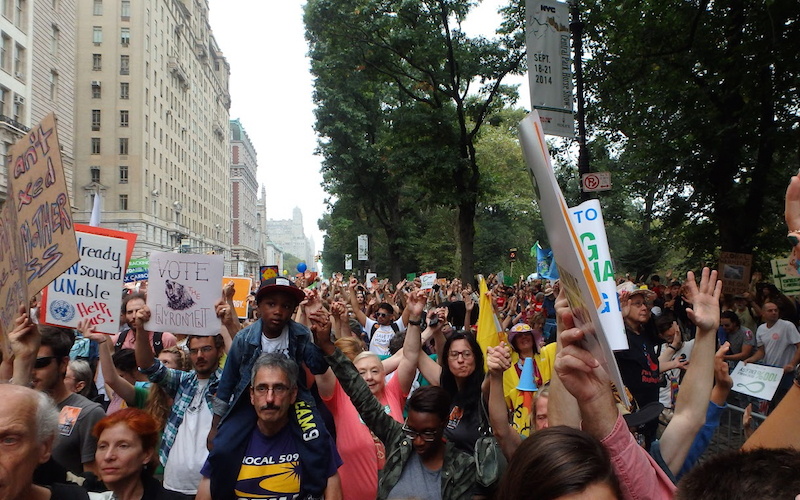
Still No Action from the UN Climate Summit Meeting
Sept. 23, 2014 saw the single most important meeting on climate change in five years, a gathering of most world leaders at the United Nations in New York. The centerpiece of the gathering was a poem sadly heightened by solastalgia, the sadness felt by those who sense their planet changing – degrading – beyond all recognition. It was presented by 26-year old, Kathy Jetnil-Kijiner, Civil Society Representative from the tiny atolls of the Marshall Islands. The Marshall Islands is among the countries most affected by climate change — a minute change to the climate of these tiny atolls could destroy them, and erode all else.
Kijiner read a poem she wrote for her daughter about the “race to save humanity.” She called out “blindfolded bureaucracies” and promised her seven month old daughter that: “No one’s drowning, baby/No one’s moving/No one’s losing their homeland/No one’s become a climate change refugee/Or should I say…no one else.” Many world leaders were moved to tears. The struggle of those countries most affected by climate change impacts us all. After her recitation in front of 120 heads of state, her daughter and husband joined her on stage, to a standing ovation. An official U.N. Twitter account said many world leaders remembered a stirring speech from the Philippines representative Yeb Saño during the last major U.N. meeting on climate change, held just days after Typhoon Haiyan. But many observers would say almost nothing concrete or tangible was accomplished at the meeting, certainly not as a result of this poem. Others, including Ban Ki Moon himself, would argue that tangible change was not the goal- that a broad, heightened awareness of the issues was the goal, and as such, the meeting was a big success.
A movement to fight climate change has real people power
The most surprising development of the summit didn’t unfold in the halls of the UN. It happened two days before the summit, when an upstart environmental group, 350.org, headed by Bill McKibben, organized a march throughout midtown Manhattan that attracted 400,000 people. Hundreds of smaller demonstrations were staged around the globe. The turnout, especially for the New York march, was far greater than anyone, even organizers, expected. “Our citizens keep marching,” President Barack Obama said in his Tuesday address, “We cannot pretend we do not hear them. We have to answer the call.”
The U.S. Department of State’s special envoy for climate change, Todd Stern, asked about the outcomes of the climate change summit, started talking about the impact of the march instead, calling it the biggest climate demonstration ever.
“You had [400,000] people on the streets of Manhattan,” Stern told reporters at the summit’s conclusion. “You have to say that that matters.” The UN’s Ban marched in the demonstration, held just a day before his climate summit and was overjoyed by the experience: “Two days ago I was part of a massive people’s climate march in New York,” Ban said. “I was overwhelmed by the energy of the tens of thousands of people.”
Once inside the halls of the United Nations, however, the story was different. The one-day summit drew 120 heads of state as well as high-level government officials, chief executive officers (CEOs), celebrities and civil society representatives. Secretary General Ban Ki Moon sought to mobilize world leaders’ will to implement bolder policies to fight climate change and develop a more environment-friendly planet. He sought, in short, a vocal consensus, foremost to bring public and business decision makers of the world together.
As such, the summit could be called a success, notably by Ban Ki Moon himself. If one looked for actionable pledges, however, it would be difficult to find much substance. The Climate Summit is another sort of beast. It has no legally binding status for either setting up or enforcing international action. In fact, no one is even whispering such a goal for the agenda. Voluntary commitments will be made, for sure. However, the summit aims first and ether in an unprecedented push for quick education and inspiration for concerted action…The summit reflects the determination of one man—UN Secretary-General Ban Ki-moon—and those who agree with him, to put the issue front and center before the movers and shakers of the world’s economy. If one is searching for a single significant actionable pledge, say, from China, one of the day’s most equivocal wins was a pledge of $6 million by China. This was promptly termed a truly “[p]altry donation” from UN panel participants.
China’s Vice-Premier Zhang Gaoli’s pledge of US$6 million to the international community to boost cooperation among developing nations at the United Nations Climate Summit on Sept. 23 was immediately criticized as nothing more than symbolic by other participations at the conference. Nonetheless, Zhang said, “To promote South-South cooperation on climate change, I would like to announce here that China will double its annual financial support for the establishment of South-South cooperation fund on climate change. In addition, China will provide US$6 million to support the United Nations Security General in advancing South-South cooperation on climate change.”
Notably absent was any new U.S. pledge of support for a fund designed to help poor countries adapt to climate change. Instead, Barack Obama pledged to announce new carbon-cutting targets for the United States “next year.” Mashable has a continuously updating map of climate-related pledges made on Tuesday. Obama’s “commitment” comes a day after new data showed that U.S. emissions grew in 2013 for the first time in five years helping push global emissions to a new record high. Survey results released Tuesday from the Chicago Council on Global Affairs ranks the issue relatively low on Americans’ worry list. Not only is the United States not doing our part, during Obama’s presidency, fossil fuel subsidies have actually grown.
Reaction to the day-long U.N. Climate Summit was almost uniformly negative from environmentalists, perhaps best embodied by Bill McKibben, who over the weekend helped organize a massive climate march that drew more than 400,000 people to the streets of midtown Manhattan. In a statement about Tuesday’s climate summit, McKibben said, “President Obama says America has ‘stepped up to the plate’— but if the President really wants collective ambition, he’s got to show a little more can do spirit from the world’s leading economy.” So what were the outcomes of the climate change march? It appears that collective action on the issue may not happen until the US shoulders responsibility and announces an actual strategy. Some officials at the UN Climate Summit did make concrete promises related to fossil fuels, deforestation, carbon footprints. More companies are recognizing that halting deforestation is good PR.
The biggest tangible result of the summit was a commitment by nearly 40 companies, including many big multinational corporations, to do their part to slow and eventually stop the loss of forests. The companies include Asia Pulp and Paper, Kellogg’s, Nestle, Johnson & Johnson, Wal-Mart, and Procter & Gamble. Deforestation is a major contributor to the concentration of heat-trapping gases in Earth’s atmosphere. The companies, together with 32 countries, pledged to do their part to stop deforestation by 2030.
This was largely an aspirational goal without consequences for failing to reach it. And one key country was missing from the list: Brazil, home to the Amazon rain forest. However, companies and countries did make some specific commitments to work toward this goal. For instance, the world’s three largest palm oil companies recently pledged to source all their oil from suppliers that do not chop down forests. As part of the UN declaration, they agreed to work with the Indonesian government to develop a legal backbone to add teeth to their pledge.
“Many of these companies that are signed on are the historic biggest players in deforestation in places like Brazil and Indonesia, and for them to come before the world and say that they’re going to take steps to reduce deforestation in their supply chain is pretty powerful,” said Jake Schmidt of the environmental group Natural Resources Defense Council.
Though the declaration isn’t binding, environmentalists said it’s important because it shows industry is agreeing to address the problem. “Imagine Exxon lobbying for cap and trade,” said Joel Finkelstein of Climate Advisers.
Why did they do it?
“Consumers have sent companies a clear signal that they do not want their purchasing habits to drive deforestation, and companies are responding,” said Paul Polman, chief executive officer of Unilever, a consumer products company.
Responses by country:
- The United Kingdom announced it would cut subsidies for fossil fuels.
- Peru will better regulate deforestation, Germany will not support any new coal plants.
- Congo and Uganda will restore 30 million hectares of damaged forests by 2020.
- Japan and France will, they say, become low-carbon role models.
- Georgia said it will become a “hydropower giant.”
- Northern Europe – several Scandinavian countries claimed they will become entirely fossil fuel-free by mid-century.
- The European Union promised to reduce emissions by 80 to 95 percent within the same timeframe.
Additionally, more than 30 countries set a 2030 deadline to completely eliminate deforestation—a goal the UN says will have the same effect as taking every car in the world off the road. But these kinds of actionable pledges were in large part absent from the world’s three biggest polluters: the US, China, and India. Others such as Russia, Australia, Canada and UAE didn’t even bother to send high-level delegations. Heads of states from the world’s two most populous countries: China and India –did not even attend.
Of that group (China and India), Beijing ‘s emissary promised for the first time to work to mitigate the effects of climate change. Vice Premier Zhang Gaoli said that China would reduce its carbon emissions by 45 percent from 2005 levels. Prakash Javadekar, India’s minister of environment, forests and climate change, said his country would cut emissions by up to a quarter over 2005 levels by 2020. But this is a misleadingly flat figure- it is the same figure that India proclaimed at the RIO+20 climate conference in 2009.
It appears that the US must shoulder responsibility and announce an actual strategy. Without the US, other powers like China and India—who both happen also to be among the world’s most climate-vulnerable nations—will be reluctant to act. That’s a sentiment they’ve expressed ever the last major summit in Copenhagen in 2009. Jeffrey D. Sachs, the Director of The Earth Institute, Quetelet Professor of Sustainable Development, and Professor of Health Policy and Management at Columbia University, who is also Special Advisor to United Nations Secretary-General Ban Ki-moon on the Millennium Development Goals, says:
Everyone wants to fix the problem, but no one wants to do more than others. This means fundamentally changing the world’s energy systems, moving to a near-zero carbon economy in the next few decades, and outlawing the attitude of impunity that still prevails among multinational corporations.
And time is almost up. “We all have to decide we’re going bold together—and we’re not there by any means,” Sachs told VICE. “Paris is really our last chance to get this right. But he also said that Obama’s statement fell far short of an actionable plan.
“Where’s the US plan?” Jeffrey Sachs wondered in an interview at the summit. “It doesn’t exist. With all the speeches President Obama may give about the commitment, where is the US pathway to deep de-carbonization by 2050? It doesn’t exist—they’ve never written it down.”
Still, he held on to at least a hint of optimism. “I think there’s a good chance for an agreement next year,” he said, “But whether that is a real agreement or a photo op—that remains to be seen.”

